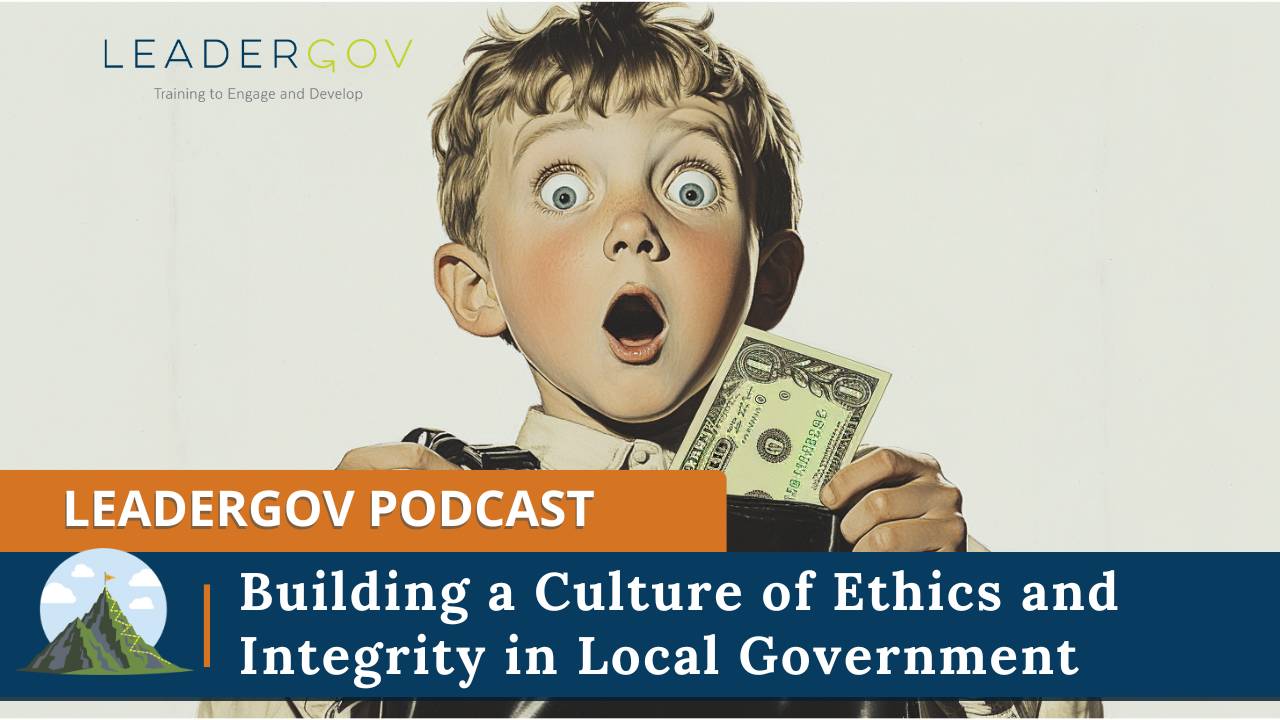Building a Culture of Ethics and Integrity in Local Government

Ethics and integrity aren’t just buzzwords in local government—they’re the foundation of public trust, team cohesion, and long-term success. When leaders prioritize ethical behavior, they create a culture where employees feel accountable, engaged, and proud of their work. But fostering this kind of culture doesn’t happen by accident—it requires intentional effort and strong leadership.
In a recent LeaderGov workshop, government leaders from across the country came together to explore practical strategies for promoting ethics and integrity in their organizations. Through insightful discussions and real-world examples, they uncovered key approaches to strengthening ethical standards within their teams.
Why Ethics Matter in Local Government
As William Whitson, a seasoned local government professional, put it, “working in local government is like "living in a fishbowl." Every decision, policy, and action is under public scrutiny. When integrity is compromised, the consequences ripple throughout the entire community, eroding trust and damaging credibility.
A recent LeaderGov survey highlighted common ethical challenges faced by local governments:
- 70% of respondents felt their agency had a strong commitment to ethical behavior.
- 26% cited inconsistent enforcement of ethical standards as a major challenge.
- 43% pointed to a lack of accountability among staff and leadership.
- 22% highlighted unclear policies and inadequate training.
- 9% felt pressure to prioritize efficiency over ethics.
These findings reinforce the need for clear ethical guidelines, consistent leadership, and a workplace culture that values integrity.
Practical Ways to Promote Ethics and Integrity
To move from ethical awareness to ethical action, leaders must be proactive. Here’s how:
- Lead by Example
Ethical behavior starts at the top. Leaders who consistently demonstrate honesty, fairness, and transparency set the tone for their teams. Employees are far more likely to uphold ethical standards when they see their supervisors modeling them daily. - Make Ethics Training Engaging and Relevant
Traditional ethics training can feel dry and detached from real-world challenges. Instead, consider interactive workshops with case studies and real-life scenarios. One government agency partnered with a local university to create an ethics handbook that includes practical examples, making training more relatable and impactful. - Foster Open and Honest Conversations
Encourage a culture where employees feel safe raising ethical concerns. When ethical discussions are part of regular team meetings, employees become more comfortable addressing potential issues before they escalate. One participant shared how their team implemented a "Courageous Conversations" initiative to facilitate open dialogue about ethical dilemmas. - Reinforce Ethical Standards in Everyday Operations
Ethical guidelines shouldn’t be buried in a lengthy manual that no one reads. Instead, make them visible and accessible. Use quick-reference guides, posters, and regular team discussions to keep ethical principles top of mind. Some organizations incorporate a short ethics check-in at the beginning of staff meetings. - Recognize and Reward Ethical Behavior
Ethical cultures thrive when employees see that integrity is valued—not just expected. Consider implementing a recognition program, such as a "Caught You Doing Something Good" initiative, where employees are acknowledged for ethical decision-making and teamwork.
Final Thoughts: Building a Lasting Ethical Foundation
Strong leadership is the backbone of an ethical workplace. As William Whitson puts it, mentorship and peer support are crucial when navigating ethical decisions. Leaders must actively encourage employees to seek guidance in tough situations and provide clear avenues for reporting concerns.
Ethics go beyond compliance—they create an environment where employees take pride in doing the right thing. When leaders prioritize ethics, they boost public trust, team morale, and the ability to serve their communities effectively.
Building a lasting ethical culture starts with leadership that leads by example. By fostering meaningful training, recognizing ethical behavior, and consistently modeling integrity, leaders make ethics a core value. When ethics are woven into every aspect of the organization, the whole team wins, and the public’s trust in local government grows stronger. This foundation of integrity is key to not just the success of the organization but the community it serves.

